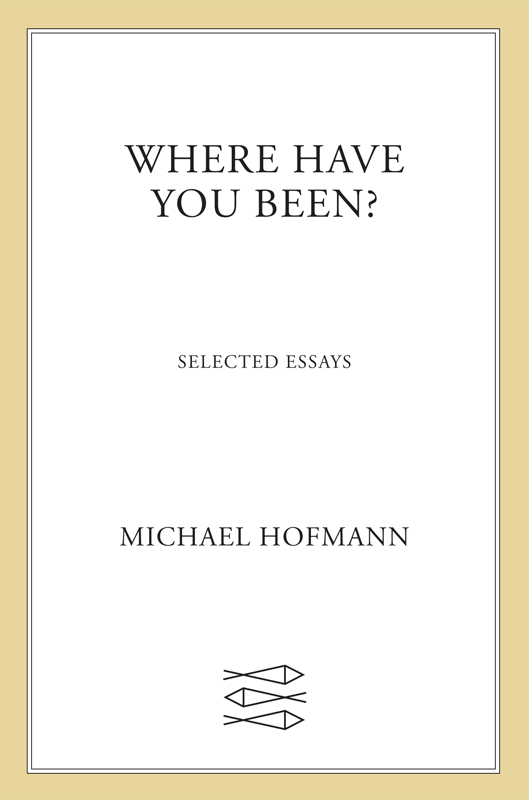
Where Have You Been?
Selected Essays
کتاب های مرتبط
- اطلاعات
- نقد و بررسی
- دیدگاه کاربران
نقد و بررسی

Starred review from October 6, 2014
The heft of these 30 substantial, methodical essays answers the title of this collection from critic, poet, and translator Hofmann (Behind the Lines). The subjects include fiction writing, poetry, and, briefly, painting and film. Hofmann is equally deft when lingering over a haiku by Seamus Heaney or expounding on the art of translation, which he compares to the “setting of a broken bone, a graft.” Hofmann’s touchstones are Robert Lowell, Elizabeth Bishop, and James Schuyler, so it’s fitting that he begins by examining the Lowell–Bishop correspondence and includes individual essays on each of these poets. His famous 2010 takedown of Stefan Zweig (he “just tastes fake”) clearly establishes Hofmann’s willingness to set himself against popular opinion. His admiring essays on Robert Walser, John Berryman, and Basil Bunting, on the other hand, might well send readers running back to the original texts. Despite Hofmann’s versatility, he is in many respects a poets’ poet, delighting in obscure vocabulary and lengthy poems, and expressing a deeply personal connection to the writing he admires. Based on this collection, Hofmann deserves to be considered one of today’s premier critics.

October 15, 2014
A noted critic celebrates the arts. In this vibrant collection of previously published essays, poet, critic and translator Hofmann (Poetry and Translation/Univ. of Florida; Selected Poems, 2009, etc.) elevates criticism to an art. He amply fulfills his aim to "investigate and animate" his subjects, "make them resonate, play with and in and over them...." Many of those subjects are poets, including Elizabeth Bishop, Robert Lowell, Ted Hughes, Seamus Heaney, Basil Bunting and John Berryman. But Hofmann also extends his "noticings" to painter Max Beckmann, writer and artist Kurt Schwitters, and Austrian playwrights Arthur Schnitzler and Thomas Bernhard. He considers Gunter Grass' belated admission of SS membership ("The horrible suspicion arises that Grass' deepest project here is the destruction of meaning. Not so much 'peeling the onion' as 'applying the whitewash' "). Hofmann also reflects on Antonioni's movie The Passenger, "a mystery or a mystification" that he found especially powerful. Among the most luminous essays are those responding to poets and their work. The Bishop-Lowell correspondence, writes Hofmann, reads like "an epistolary novel" that reveals "an ideally balanced, ideally complex account of a friendship, a race, a decades-long conspiracy, a dance (say, a tango?)." Bishop emerges as the more sympathetic of the two, offering "arresting and beautiful observations" and genuine interest in her friend; Lowell, on the other hand, "seems to endow even people quite close to him...with very little reality." An admiring essay on Bishop notes her reticence to engage in the confessional poetry in which Lowell indulged, but an equally admiring essay on Lowell calls him "heroic." "To say that anyone who cares about poetry should read Lowell is not enough....Anyone who cares about writing, or about art, or about life, should read Lowell." As these passionate essays attest, Hofmann cares deeply: about writing, art and the creative possibilities of criticism.
COPYRIGHT(2014) Kirkus Reviews, ALL RIGHTS RESERVED.

November 1, 2014
In a variation on Hofmann's conclusion to his piece on Frederick Seidel, let it be said: Thank God for Mike Hofmann. Known best as a translatorhis translations of Gottfried Benn's Impromptus (2013), for example, is a marvel, maybe even a masterpieceHofmann is also an exceptional critic and an excellent poet. Some of the 30 essays collected here are about writers who write in German, his specialty, and many are about poets. We can't ask for, much less expect, a better piece about Elizabeth Bishop. A sensitive appreciation that disdains hagiography, it focuses on the virtues of the poems. This is the best sort of criticism: we learn about an author, her works, form, vicissitudes of style, and hardly notice Hofmann's learning because of his lively, lucid writing. Sadly, very few reviewers are this candid about their enthusiasms, or this gleeful yet nuanced in their expression. Hofmann concludes with a beautiful sentence about Berryman's Dream Songs, But almost all make their own distinct mark on silence and the page. About good poetry, could it be better said?(Reprinted with permission of Booklist, copyright 2014, American Library Association.)

July 1, 2014
An award-winning poet, translator, and critic, Hofmann can be trusted to provide gleaming insights in this collection of essays, which focuses on poetry of the last 100 years. Here's "poets' poet" Elizabeth Bishop, ready-to-spook-you Frederick Seidel, meditations on the art of translation, and more.
Copyright 2014 Library Journal, LLC Used with permission.

























دیدگاه کاربران